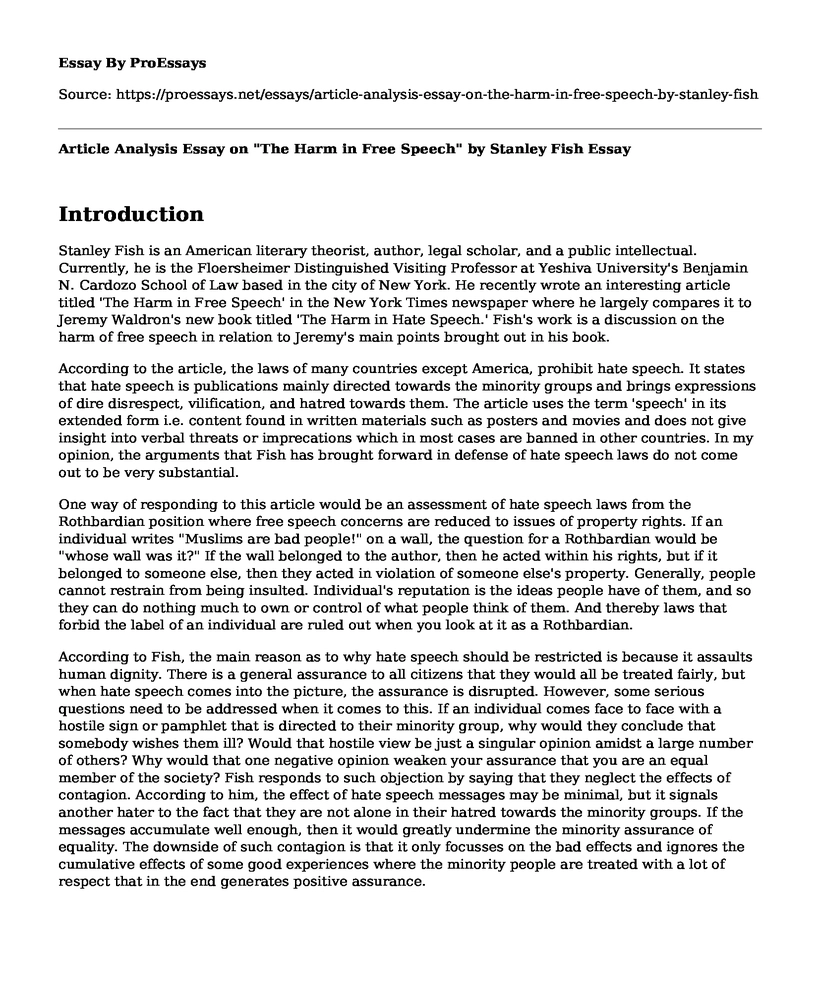Introduction
Stanley Fish is an American literary theorist, author, legal scholar, and a public intellectual. Currently, he is the Floersheimer Distinguished Visiting Professor at Yeshiva University's Benjamin N. Cardozo School of Law based in the city of New York. He recently wrote an interesting article titled 'The Harm in Free Speech' in the New York Times newspaper where he largely compares it to Jeremy Waldron's new book titled 'The Harm in Hate Speech.' Fish's work is a discussion on the harm of free speech in relation to Jeremy's main points brought out in his book.
According to the article, the laws of many countries except America, prohibit hate speech. It states that hate speech is publications mainly directed towards the minority groups and brings expressions of dire disrespect, vilification, and hatred towards them. The article uses the term 'speech' in its extended form i.e. content found in written materials such as posters and movies and does not give insight into verbal threats or imprecations which in most cases are banned in other countries. In my opinion, the arguments that Fish has brought forward in defense of hate speech laws do not come out to be very substantial.
One way of responding to this article would be an assessment of hate speech laws from the Rothbardian position where free speech concerns are reduced to issues of property rights. If an individual writes "Muslims are bad people!" on a wall, the question for a Rothbardian would be "whose wall was it?" If the wall belonged to the author, then he acted within his rights, but if it belonged to someone else, then they acted in violation of someone else's property. Generally, people cannot restrain from being insulted. Individual's reputation is the ideas people have of them, and so they can do nothing much to own or control of what people think of them. And thereby laws that forbid the label of an individual are ruled out when you look at it as a Rothbardian.
According to Fish, the main reason as to why hate speech should be restricted is because it assaults human dignity. There is a general assurance to all citizens that they would all be treated fairly, but when hate speech comes into the picture, the assurance is disrupted. However, some serious questions need to be addressed when it comes to this. If an individual comes face to face with a hostile sign or pamphlet that is directed to their minority group, why would they conclude that somebody wishes them ill? Would that hostile view be just a singular opinion amidst a large number of others? Why would that one negative opinion weaken your assurance that you are an equal member of the society? Fish responds to such objection by saying that they neglect the effects of contagion. According to him, the effect of hate speech messages may be minimal, but it signals another hater to the fact that they are not alone in their hatred towards the minority groups. If the messages accumulate well enough, then it would greatly undermine the minority assurance of equality. The downside of such contagion is that it only focusses on the bad effects and ignores the cumulative effects of some good experiences where the minority people are treated with a lot of respect that in the end generates positive assurance.
Conclusion
In conclusion, all our actions in society should make the world better, where we all live in peace and harmony. The right of freedom of speech should be entitled to every individual, but that right should not be used against certain individuals in the society commonly referred to as the minority.
Works Cited
Fish, Stanley. "The Harm in Free Speech." The New York Times, 2012, June 4. https://opinionator.blogs.nytimes.com/2012/06/04/the-harm-in-free-speech/
Cite this page
Article Analysis Essay on "The Harm in Free Speech" by Stanley Fish. (2022, Dec 03). Retrieved from https://proessays.net/essays/article-analysis-essay-on-the-harm-in-free-speech-by-stanley-fish
If you are the original author of this essay and no longer wish to have it published on the ProEssays website, please click below to request its removal:
- Transgender Rights Pertaining the Use of Bathrooms - Essay Sample
- Essay Sample on Racial Divide in United States
- Essay on Effects of Internet to a Teenager's Social Development
- Essay on Executives and Integrated Business Communication: A Necessary Combination
- Gender Composition: Social Construction of Sex From Genitalia Identity - Essay Sample
- Article Analysis Essay on Single Mother Parenting and Adolescent Psychopathology
- Essay Sample on Solving Ethical Dilemmas in Social Work







